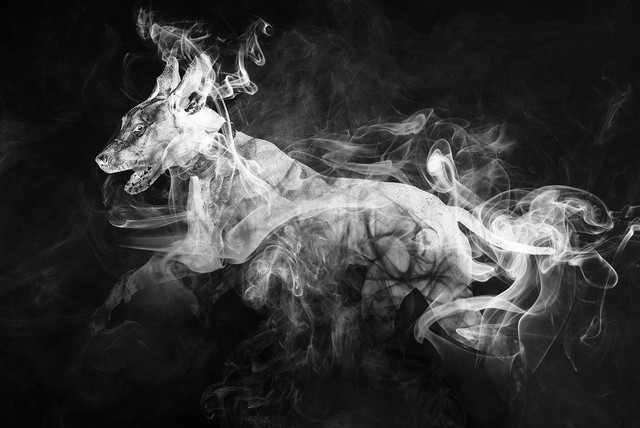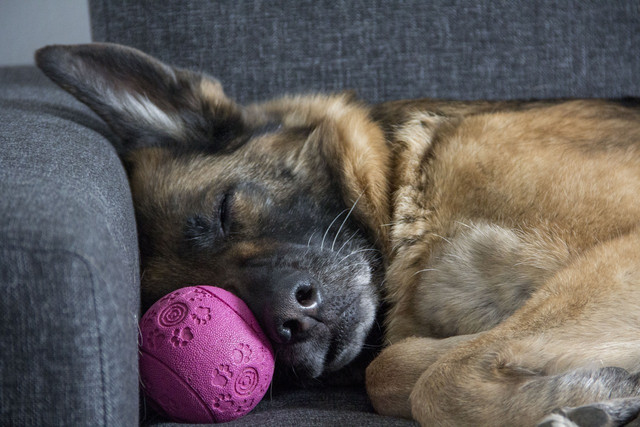Is incense bad for dogs? Find out if your favorite fragrances are harmful to your dog’s health and why — and if there are safer alternatives.
Most of us associate burning incense with meditation, which itself is associated with a wide range of health benefits. For many people, inhaling the subtle, earthy aroma of incense is one of several ways to reduce stress. It can also be a spiritual practice or simply a way to keep your home smelling fresh.
At some point, as you breathe in the fragrant plumes of smoke, you may wonder if burning incense is bad for you. Unfortunately, our bodies experience smoke from incense similar to smoke from any other source.
Thus, for dog owners and lovers, it’s worth asking: is incense bad for dogs, too? Researchers have investigated this question with rigorous analysis. Let’s find out what they have to say.
Is Incense Bad for Dogs?

(Foto: CC0 / Pixabay / Syaibatulhamdi)
Dogs and their owners share the same environment, so it follows that when we burn incense, our dogs experience the same health effects. Reliable data exploring the impact of incense on pets is scarce. That makes it challenging to answer whether incense is bad for dogs.
A Taiwanese study of 348 pets (230 dogs and 118 cats) found that dogs with respiratory disorders were exposed to incense burning more than those without those disorders. The overall results of this study, which tested various triggers for respiratory disease in pets, were inconclusive.
Beyond this research, however, little information is available. That said, studies do exist analyzing the effects of incense on air pollution, as well as the impact it has on humans.
Research shows that burning incense releases particulate matter (PM), volatile organic compounds (VOCs) and polyaromatic hydrocarbons — all highly toxic substances. The level of toxicity varies between brands.
Furthermore, burning incense generates four times the PM of cigarettes, and incense smoke has been found to contain poisonous gases, including carbon dioxide and carbon monoxide. Disposing of the ash further increases the negative environmental consequences.
These results correlate to earlier findings that, on average, burning incense produces PM greater than 45 milligrams per gram — compared to 10 milligrams per gram for cigarettes. Researchers also documented associations between these toxic agents and air pollution-related disorders in humans.
Air pollution poses a risk to our canine companions, too, according to experts. As it is, fragrances and smoke can overpower their heightened sense of smell alone.
Canine-Specific Risks



(Foto: CC0 / Pixabay / PicsbyFran)
Scented chemicals, including those arising from the burning of incense, are found in greater quantities on dogs than people. Exposure can come from several directions; however, inhalation and rubbing against people and household surfaces appear to be the primary sources.
According to the International Boarding and Pet Services Association, all synthetic fragrances can be damaging to dogs and other household animals. They state that:
- Dogs tend to spend a lot of time near or on the floor, where indoor air pollutants and particulate matter eventually end up.
- Dogs and other pets groom themselves and each other, increasing their exposure to pollutants on fur and the floor.
- Many pets spend up to 100 percent of their time indoors.
Alternatives to Incense



(Foto: CC0 / Pixabay / vivros62)
So, it looks like incense is bad for dogs. Fear not! There are many ways to make your home smell good without burning incense.
Burning incense that claims to be safe for dogs is not an approach we recommend, as burning anything will generate particulate matter. If you wish to continue using incense, keep your canine companion in a separate room and always burn it in a well-ventilated area.
Keep floors, surfaces and other areas your dog is likely to roll around clean and free of toxic residual particulate matter and toxins. Furthermore, wash your dog free of any noxious compounds regularly with DIY dog shampoo.
1. Make Potpourri
Using natural methods that are safe for you, your dog and the planet is key. Learn how to make wet or dry potpourri for months of fragrance at little-to-no cost. You might even find uses for your kitchen leftovers and empty jars.
2. Essential Oils
Make a DIY oil diffuser and fill it with organic, pure essential oils. Many essential oils are safe and effective natural sources of fragrances and do not carry any health risks. Clove, tea tee and patchouli are just a few examples of oils that smell great in the home.
Frankincense extract has demonstrated several beneficial properties for dogs, including relief from joint pain and cancer-fighting, antimicrobial and anti-depressive benefits. So, why not add some of this ancient oil to your blend?
3. Candles
Try making DIY scented candles or soy candles at home with natural ingredients that won’t harm your health.
4. Natural Room Spray
Clean with a DIY dusting spray that adds extra fragrance, then mist an aromatic linen spray over fabrics and furnishings for lasting fragrance without the risks incense poses for you and your dog.
Read more:
- 3 Natural Flea Repellents for Dogs and How to Get Rid of Fleas
- Should Your Cat Sleep in Your Bed? All Risks Explained
- 13 Noteworthy Houseplants That Are Safe for Cats and Dogs
Do you like this post?






